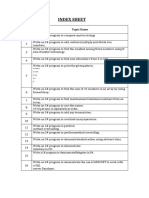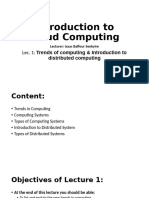02 Functional Programming
Uploaded by
Pavel Zinevka02 Functional Programming
Uploaded by
Pavel ZinevkaBasics of functional
programming in Java 8
A pragmatic overview
© Krzysztof Barteczko 2014 (translated
from Polish by Edgar Głowacki)
The gist of functional programming
No states of processing – solely functions which return results based on provided arguments – a
very important feature esp. in distributed processing
Functional programming paradigm – unlike imperative programming paradigm – focuses more on the
result (or processing single item) than specifying steps of algorithm which should be performed
Functional programming simplifies problem decomposition
Sample: create a list of square values of particular elements of integer number array
Imperative code:
List<Integer> src = Arrays.asList(5, 72, 10, 11, 9);
We focus on algorithm: List<Integer> target = new ArrayList<>();
(1) iterate over the source for (Integer n : src) {
collection; if (n < 10) { // filtering
(2) square element and add target.add(n * n); // processing and merging
result to the target. } // result
}
We focus on goals:
(1) specify predicate to filter the elements we want to
process;
(2) specify processing of an element.
Functional programming scheme:
List<Type> target = create( src,
a condition for filtering elements from src list,
specify the operation to perform on the selected elements );
© Krzysztof Barteczko 2014 (translated
from Polish by Edgar Głowacki)
Specifying goals with interfaces
Interface Filter declares a predicate – a method test() responsible for selecting elements – returns
true if an element meets the criteria, false – otherwise.
public interface Filter<V> {
boolean test(V v);
}
Interface Transformer declares a method responsible for processing an element.
public interface Transformer<T,S> {
T transform(S v);
}
We have separated particular stages and realized intermediate phases of processing we can achieve
the ultimate goal by combining them.
static <T, S> List<T> create(List<S> src, Filter<S> f, Transformer<T, S> t) {
List<T> target = new ArrayList<>();
for (S e : src) {
if (f.test(e)) { // invoke filtering to be specified in usage
target.add(t.transform(e)); // invoke processing to be specified in usage }
} // and then merge the result
return target;
}
© Krzysztof Barteczko 2014 (translated
from Polish by Edgar Głowacki)
Before Java 8
We could use anonymous classes and implement interfaces at site of use
List<Integer> src = Arrays.asList(5, 72, 10, 11, 9);
List<Integer> target = create(
src,
/** boilerplate code is greyed out */
new Filter<Integer>() {
public boolean test(Integer n) {
return n < 10;
}
},
new Transformer<Integer, Integer>() {
public Integer transform(Integer n) {
return n * n;
}
});
We had to provide some so called boilerplate code – i.e. pieces of code which do not introduce
much added value and solely result from the syntax of the programming language.
In the above sample the boilerplate parts are highlighted in blue, the parts which introduce
significant value are highlighted in green.
© Krzysztof Barteczko 2014 (translated
from Polish by Edgar Głowacki)
Lambda expression
Lambda expression – an anonymous method considered as an object
List<Integer> Lambda expression with parameter n returns
target = create(src,
n -> n < 10, result of comparison n < 10
n -> n * n The compiler fits lambda-expression n -> n < 10
); into the second parameter (Filter<S>) of create()
method.
As a result method Filter<S>.test() is
Lambda expression with parameter n returns
implemented by the provided lambda expression.
squared n (i.e. n * n).
The required boilerplace code is generated by
The compiler fits lambda expression
the compiler
n -> n * n into the third parameter
(Transformer<T, S>) of create() method.
Method Transformer<T, S>.transform() is
implemented by the provided lambda
lambda expression in Java
expression.
The required boilerplace code is generated parameter list -> code
by the compiler.
parameter list – list of parameters enclosed
in brackets (if there are more than one)
code – a (1) single expression or a (2) set of
instructions enclosed in curly brackets
© Krzysztof Barteczko 2014 (translated
from Polish by Edgar Głowacki)
public class Employee {
private String lname;
Let us look at the simple private String fname;
Employee private Integer age;
private Double salary;
class.
public Employee(String lname, String fname, Integer age, Double salary) {
this.lname = lname;
this.fname = fname;
this.age = age;
this.salary = salary;
}
public String getLname() {
return lname;
}
public String getFname() {
return fname;
}
public Integer getAge() {
return age;
}
public Double getSalary() {
return salary;
}
public void setSalary(Double salary) {
this.salary = salary;
}
@Override
public String toString() {
return lname + " " + fname;
}
}
© Krzysztof Barteczko 2014 (translated
from Polish by Edgar Głowacki)
Flexibility
List<Integer> num = Arrays.asList( 1, 3, 5, 10, 9, 12, 7);
List<String> txt = Arrays.asList(
“one", “two", “three", “four", “five", “six" );
• various data types
List<Employee> emp = Arrays.asList( • various predicates
new Employee(“Smith", “John", 34, 3400.0),
new Employee(“Brown", "Alexander", 27, 4100.0), • various transforms
new Employee(“Allen", “Sofia", 33, 3700.0),
new Employee(“Owen", “Michael", 41 , 3600.0)
);
System.out.println(
create(num, n -> n % 2 != 0, n -> n * 100)
);
System.out.println(
create(txt,
s -> s.startsWith(“t"),
s -> s.toUpperCase() + " " + s.length())
);
List<Employee> givePayRise =
create(emp,
e -> e.getAge() > 30 && e.getSalary() < 4000, [100, 300, 500, 900, 700]
e -> e [TWO 3, THREE 5]
); Pay rise should be given to:
System.out.println(“Pay rise should be given to:"); [Smith John, Allen Sofia, Owen
System.out.println(givePayRise); Michael]
© Krzysztof Barteczko 2014 (translated
from Polish by Edgar Głowacki)
Mapping to other result types and method references
The result of method create() does not need to be list of the same type as the source list.
For instance we can easily get a list of employee salaries.
List<Double> sal =
create(emp,
e -> true,
e -> e.getSalary() [3400.0, 4100.0, 3700.0, 3600.0]
);
System.out.println(sal);
Instead of defining lamba expression we can also refer methods (method reference) defined in a
class.
e -> e.getSalary() is equivalent to Employee::getSalary
create(emp,
e -> true,
Employee::getSalary
);
© Krzysztof Barteczko 2014 (translated
from Polish by Edgar Głowacki)
Modifying list elements with lambda expression
Let us create interface Modifier specifying a single method modify()
public interface Modifier<S> {
void modify(S v);
}
Let us define method change(), which modifies elements of the source list if they meet some given
predicate.
static <S> void change(List<S> list, Filter<S> f, Modifier<S> mod) {
for (S e : list) {
if (f.test(e)) {
mod.modify(e);
}
}
}
© Krzysztof Barteczko 2014 (translated
from Polish by Edgar Głowacki)
Modifying list elements with lambda expression
List<Employee> emp =
Arrays.asList(
new Employee("Kowal", "Jan", 34, 3400.0),
new Employee("As", "Ala", 27, 4100.0),
new Employee("Kot", "Zofia", 33, 3700.0),
new Employee("Puchacz", "Jan", 41, 3600.0)
);
change(
emp,
e -> e.getAge() > 30 && e.getSalary() < 4000,
e -> {
double oldSalary = e.getSalary();
double newSalary = oldSalary + 200;
e.setSalary(newSalary);
});
for (Employee e : emp) {
System.out.println(e + " " + e.getSalary());
}
Kowal Jan 3600.0
As Ala 4100.0
Kot Zofia 3900.0
Puchacz Jan 3800.0
© Krzysztof Barteczko 2014 (translated
from Polish by Edgar Głowacki)
Do we need to specify our custom interfaces?
No, we do not.
There are interfaces for frequent lambda expression usage schemes available out of the box in
package java.util.function.
Interfaces:
(1) java.util.function.Predicate and
(2) java.util.function.Function
static <T, S> List<T> create(List<S> src, Predicate<S> filter, Function<S, T> func) {
List<T> target = new ArrayList<>();
for (S e : src) { Method Predicate.test() evaluates boolean
if (filter.test(e)) {
target.add(func.apply(e)); result based on value of type S (generic
} parameter)
}
return target;
}
Method Function.apply() evaluates result of
type T based on value of type S
© Krzysztof Barteczko 2014 (translated
from Polish by Edgar Głowacki)
Function<S, T> vs. Consumer<S>
Apart from Function<S, T> which returns a value java.util.function package provides interface
Consumer<S> whose single method accept() simply processes the input of type S.
NOTE: Collection processing scheme based on lambda expression resembles the one described in
Visitor design pattern which also defines method accept().
static <S> void change(List<S> list, Filter<S> f, Consumer<S> mod) {
for (S e : list) {
if (f.test(e)) {
mod.accept(e);
}
}
}
Method Consumer<S>.accept() does not return
any result.
The counterparts of java.util.function.Function<S, T> and java.util.function.Consumer<S> in
Microsoft .NET platform are delegates (types for method references) System.Function<S, T> and
System.Action<S> respectively.
© Krzysztof Barteczko 2014 (translated
from Polish by Edgar Głowacki)
Streams (stream processing) – introduction
We do not need to define our custom interfaces whose methods are implemented by lambda
expressions.
Do we need to define methods which operate on lists – i.e. create() and change()?
No, we do not need either
create( List<Employee> givePayRise =
emp, create(
e -> true, // select all elements emp,
e -> e.getSalary() e -> e.getAge() > 30 && e.getSalary() < 4000,
); e -> e // return the processed element
);
Our custom method are not very flexible – we always assume the same processing scheme:
first (1) selecting the elements and then (2) processing one by one.
Inversing the above order would require providing another implementation
We may also want to further process the output – unfortunately our simple methods create() and
change().
We can use much more generic paradigm – streams (do not confuse with I/O streams).
In general a programming language construct when multiple methods invoked one after another as a
single statement and the consecutive methods consume the output of the preceding ones is called
method chaining.
Method chaining in Microsoft .NET world is also called fluent interface.
© Krzysztof Barteczko 2014 (translated
from Polish by Edgar Głowacki)
Streams (stream processing) – overview
Overview of stream processing concept in Java.
The consecutive method in the call chain uses output of the preceding one as its input.
.map
List Stream Stream
.filter
.filter
Stream ... Stream
.map
.collect scalar value,
.reduce container,
.forEach modification
© Krzysztof Barteczko 2014 (translated
from Polish by Edgar Głowacki)
Streams (stream processing) – overview
Call of method stream() returns a stream or a sequence.
A stream allows us to further process the input with methods:
(1) map – processing;
(2) filter – filtering/selecting the elements to be subjected to further operations;
(3) collect – creating collections for the result of the preceding operations;
(4) reduce – aggregate the result of the preceding operations – i.e. create single element result;
(5) forEach – modify (or in general iterate over all) elements of the stream.
Method map() accepts a lambda expression returning a value of specified type based on input
parameter – exactly in the same way as Function<S, T>.apply() does.
Method filter() accepts a predicate as a lambda expression – exactly in the same way as
Predicate<S>.test() does.
Method filter() filters out the elements of the stream which do not satisfy the predicate.
Method collect() is the ultimate step of stream processing responsible for creating a collection (e.g.
list or array) based on object of Collector class instance (e.g. Collectors.toList()).
Method reduce() aggregates the values returned by stream processing.
Method forEach() enables processing values one by one (e.g. printing them out to the console).
© Krzysztof Barteczko 2014 (translated
from Polish by Edgar Głowacki)
Streams (stream processing) – samples
Getting a list of squared elements of src which are less than 10.
import static java.util.stream.Collectors.toList;
// ...
List<Integer> src = Arrays.asList(5, 72, 10, 11, 9);
List<Integer> target = src
.stream()
.filter(n -> n < 10)
.map(n -> n * n)
.collect(toList()); [25, 81]
Inverting the order of operations – first compute a square of the element and then filter values
greater than 80.
List<Integer> num = Arrays.asList(1, 3, 5, 10, 9, 12, 7);
List<Integer> out = num
.stream()
.map(n -> n * n)
.filter(n -> n > 80)
.collect(Collectors.toList()); [100, 81, 144]
© Krzysztof Barteczko 2014 (translated
from Polish by Edgar Głowacki)
Streams (stream processing) – map() and filter()
We can invoke map() and filter() multiple times and in an arbitrary order.
Sample:
(1) filter 3-digit strings representing numbers in decimal notation;
(2) convert filtered elements into numbers;
(3) filter even numbers;
(4) create a new list of strings in decimal notation.
List<String> snum = Arrays.asList("7", "20", "160", "777", "822");
snum = snum
.stream()
.filter(s -> s.length() == 3)
.map(s -> Integer.parseInt(s))
.filter(n -> n % 2 == 0) ["160“, "822“]
.map(n -> String.valueOf(n))
.collect(toList());
© Krzysztof Barteczko 2014 (translated
from Polish by Edgar Głowacki)
Streams (stream processing) – forEach()
We can easily implement introducing modifications to salaries of employees with forEach().
List<Employee> emp = ...
Emp
.stream()
.filter(e -> e.getAge() > 30 && e.getSalary() < 4000)
.forEach(e -> e.setSalary(e.getSalary() * 1.1));
Kowal Jan 3740
As Ala 4100
Kot Zofia 4070
Puchacz Jan 3960
In the first example we use forEach() in order to process each element returned by filter().
List<Employee> emp = ...
emp.forEach( Kowal Jan 3740
e -> System.out.printf("%s %.0f\n", e, e.getSalary()) As Ala 4100
); Kot Zofia 4070
Puchacz Jan 3960
In the second example we illustrate how to use forEach() with Iterable interface implementations
(i.e. not a stream) – a sample of one of new default methods introduced in Iterable since Java 8
© Krzysztof Barteczko 2014 (translated
from Polish by Edgar Głowacki)
Streams (stream processing) – reduce()
We can aggregate the result of stream operations performed on collections with reduce() method.
reduce(initial, function)
initial – initial value;
function – function which accepts two arguments:
(1) part the intermediate result and
(2) next consecutive stream element
part = initial
for each stream element {
reduce() processing scheme part = func.apply(part, next)
}
return part
© Krzysztof Barteczko 2014 (translated
from Polish by Edgar Głowacki)
Streams (stream processing) – reduce()
Sample – calculate total for all employees’ salaries
List<Employee> emp = Arrays.asList(
new Employee("Kowal", "Jan", 34, 3400.0),
new Employee("As", "Ala", 27, 4100.0),
new Employee("Kot", "Zofia", 33, 3700.0),
new Employee("Puchacz", "Jan", 41, 3600.0)
);
Double sum = emp
.stream()
.map(Employee::getSalary)
.reduce(0.0, (part, next) -> part + next);
System.out.println(sum);
© Krzysztof Barteczko 2014 (translated
from Polish by Edgar Głowacki)
Advantages lambda expressions in Java 8
1. a significant reduction of boilerplate code related with implementation of interfaces in
anonymous classes;
2. we do not need to create custom interfaces for operations on collections – most common
usages are supported by interfaces delivered out of the box in java.util.function package;
3. streams in Java 8 is a very flexible implementation which covers most of scenarios for
collection processing.
Streams introduced in Java 8 is a new approach for collection processing resembling
IEnumerable extension methods available in Microsoft .NET since version 3.0.
Streams enable “lazy evaluation” – i.e. evaluation of the given stream method in a
pipeline when the result for all the pipeline is requested – e.g. during iteration or
when we want to materialize the result in a list of elements.
© Krzysztof Barteczko 2014 (translated
from Polish by Edgar Głowacki)
You might also like
- Advanced C++ Interview Questions You'll Most Likely Be AskedFrom EverandAdvanced C++ Interview Questions You'll Most Likely Be AskedNo ratings yet
- Attacking Hypervisors Via Firmware and Hardware: Alex Matrosov (@matrosov)No ratings yetAttacking Hypervisors Via Firmware and Hardware: Alex Matrosov (@matrosov)44 pages
- (WWW - Entrance-Exam - Net) - TEXAS Instruments Placement Sample Paper 5No ratings yet(WWW - Entrance-Exam - Net) - TEXAS Instruments Placement Sample Paper 543 pages
- (WWW - Entrance-Exam - Net) - TEXAS Instruments Placement Sample Paper 5 PDFNo ratings yet(WWW - Entrance-Exam - Net) - TEXAS Instruments Placement Sample Paper 5 PDF43 pages
- LINQ & Entity Framework: Fons Sonnemans (Trainer)No ratings yetLINQ & Entity Framework: Fons Sonnemans (Trainer)34 pages
- Program9573776838: How To Reverse Singly Linked List?No ratings yetProgram9573776838: How To Reverse Singly Linked List?57 pages
- C++ Questions: Freshers Resource CenterNo ratings yetC++ Questions: Freshers Resource Center31 pages
- Java Programming Tutorial With Screen Shots & Many Code ExampleFrom EverandJava Programming Tutorial With Screen Shots & Many Code ExampleNo ratings yet
- UNIX Shell Programming Interview Questions You'll Most Likely Be AskedFrom EverandUNIX Shell Programming Interview Questions You'll Most Likely Be AskedNo ratings yet
- Mastering Go A Practical Guide to Developers: A Practical Guide to DevelopersFrom EverandMastering Go A Practical Guide to Developers: A Practical Guide to DevelopersMiguel Miranda de MattosNo ratings yet
- Methods of Knowledge Engineering Bayes Networks, Probabilistic ModelingNo ratings yetMethods of Knowledge Engineering Bayes Networks, Probabilistic Modeling34 pages
- 03 Functional Interfaces Lambda ExpressionsNo ratings yet03 Functional Interfaces Lambda Expressions37 pages
- Manual Unpacking of Upx Packed Executable Using Ollydbg and ImportrecNo ratings yetManual Unpacking of Upx Packed Executable Using Ollydbg and Importrec7 pages
- Surprise Test I Computational Physics and Programming (PHY-5405)No ratings yetSurprise Test I Computational Physics and Programming (PHY-5405)2 pages
- Data Processing Lesson For SS1 Third TermNo ratings yetData Processing Lesson For SS1 Third Term19 pages
- Optical Interconnect for AI ML 07-18-2023 統一證券No ratings yetOptical Interconnect for AI ML 07-18-2023 統一證券113 pages
- Rockstar Meetings in Microsoft Teams EbookNo ratings yetRockstar Meetings in Microsoft Teams Ebook28 pages
- Lecture 1 - Introduction To Cloud ComputingNo ratings yetLecture 1 - Introduction To Cloud Computing32 pages
- Planning Processes - Project Management ExerciseNo ratings yetPlanning Processes - Project Management Exercise4 pages
- Microcomputer Applications in Structural EngineeringNo ratings yetMicrocomputer Applications in Structural Engineering12 pages
- Introduction To Embedded System I/O Architectures and BusesNo ratings yetIntroduction To Embedded System I/O Architectures and Buses20 pages
- Operational Description: St500 Operation Manual Jwpark 1 of 76 St500 0.4 16-02-05No ratings yetOperational Description: St500 Operation Manual Jwpark 1 of 76 St500 0.4 16-02-0576 pages
- CDF600-0100 PROFIBUS-DP Field Bus Module: Module For Connecting A SICK Bar Code Scanner CLV6xx To The PROFIBUS-DPNo ratings yetCDF600-0100 PROFIBUS-DP Field Bus Module: Module For Connecting A SICK Bar Code Scanner CLV6xx To The PROFIBUS-DP104 pages
- Advanced C++ Interview Questions You'll Most Likely Be AskedFrom EverandAdvanced C++ Interview Questions You'll Most Likely Be Asked
- Attacking Hypervisors Via Firmware and Hardware: Alex Matrosov (@matrosov)Attacking Hypervisors Via Firmware and Hardware: Alex Matrosov (@matrosov)
- (WWW - Entrance-Exam - Net) - TEXAS Instruments Placement Sample Paper 5(WWW - Entrance-Exam - Net) - TEXAS Instruments Placement Sample Paper 5
- (WWW - Entrance-Exam - Net) - TEXAS Instruments Placement Sample Paper 5 PDF(WWW - Entrance-Exam - Net) - TEXAS Instruments Placement Sample Paper 5 PDF
- Program9573776838: How To Reverse Singly Linked List?Program9573776838: How To Reverse Singly Linked List?
- Oracle Certified Professional Java Programmer OCPJP 1Z0 809From EverandOracle Certified Professional Java Programmer OCPJP 1Z0 809
- Computer Engineering Laboratory Solution PrimerFrom EverandComputer Engineering Laboratory Solution Primer
- Java Programming Tutorial With Screen Shots & Many Code ExampleFrom EverandJava Programming Tutorial With Screen Shots & Many Code Example
- UNIX Shell Programming Interview Questions You'll Most Likely Be AskedFrom EverandUNIX Shell Programming Interview Questions You'll Most Likely Be Asked
- Mastering Go A Practical Guide to Developers: A Practical Guide to DevelopersFrom EverandMastering Go A Practical Guide to Developers: A Practical Guide to Developers
- Methods of Knowledge Engineering Bayes Networks, Probabilistic ModelingMethods of Knowledge Engineering Bayes Networks, Probabilistic Modeling
- Manual Unpacking of Upx Packed Executable Using Ollydbg and ImportrecManual Unpacking of Upx Packed Executable Using Ollydbg and Importrec
- Surprise Test I Computational Physics and Programming (PHY-5405)Surprise Test I Computational Physics and Programming (PHY-5405)
- Microcomputer Applications in Structural EngineeringMicrocomputer Applications in Structural Engineering
- Introduction To Embedded System I/O Architectures and BusesIntroduction To Embedded System I/O Architectures and Buses
- Operational Description: St500 Operation Manual Jwpark 1 of 76 St500 0.4 16-02-05Operational Description: St500 Operation Manual Jwpark 1 of 76 St500 0.4 16-02-05
- CDF600-0100 PROFIBUS-DP Field Bus Module: Module For Connecting A SICK Bar Code Scanner CLV6xx To The PROFIBUS-DPCDF600-0100 PROFIBUS-DP Field Bus Module: Module For Connecting A SICK Bar Code Scanner CLV6xx To The PROFIBUS-DP






























































































